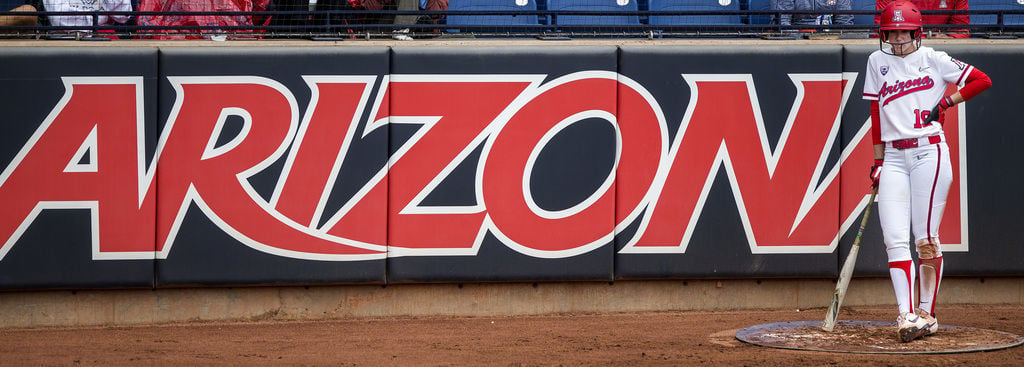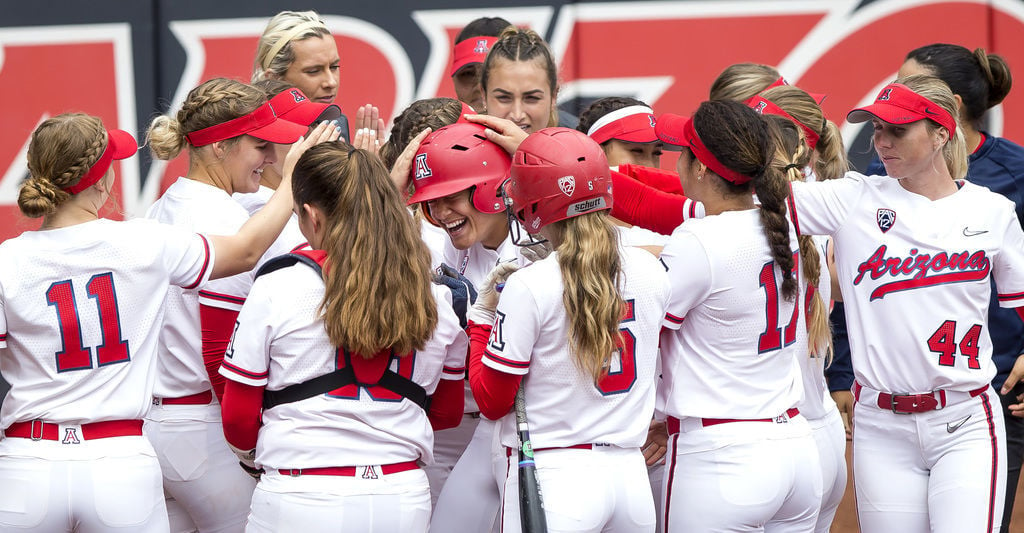UA softball stars Jessie Harper and Alyssa Palomino-Cardoza never had any doubt that if the NCAA granted them an extra year of eligibility, they would take it.
The certainty of that option speaks volumes about the importance of women’s sports at Arizona, athletic director David Heeke’s efforts and the power and pull of coach Mike Candrea.
“It seemed like if the NCAA was going to allow it, that Arizona was going to back it 100%,” Harper said. “I didn’t even think that there was a shadow of a doubt that once the NCAA granted it, that I couldn’t come back.”
Spring sports typically don’t generate revenue. That includes most, if not all, softball programs. After the cancellation of March Madness depleted a significant chunk of most athletic department’s money pile, Wisconsin — with the 11th-highest revenue in college athletics in 2017-18 — closed off the option to return. In an open letter to donors and fans, Heeke estimated it will cost Arizona $600,000 to bring spring sports’ seniors back for one more year. That figure is toward the low end of USA Today’s projections for public Power 5 conference programs.
That money must come from somewhere. Washington State announced voluntary salary cuts for the athletic director, football coach and men’s basketball coach, along with voluntary relinquishment of bonuses for coaches in those sports to help create $300,000 in student aid. It’s unlikely that the cuts alone will cover all the expenses for athletes wishing to return.
There is an even greater fear on the horizon: the devastating blow of a canceled, or even postponed, college football season. But even if football is played, minor sports programs could be on the chopping block. Commissioners from the “Group of 5” — the non-Power 5 conferences — have asked the NCAA for temporary relief from regulatory requirements, including sports sponsorship minimums, according to Yahoo Sports. Cincinnati eliminated men’s soccer on Tuesday, and other schools could follow suit.
Amid that backdrop, Harper — quarantined in her family’s California home — talked about the significance of a fifth year, a renewed chase for the all-time home-run crown and, most importantly, Arizona’s quest for its first national title since 2007.
“When we first found out the news, a lot of our seniors came together and said, ‘No matter what, we’re coming back. We need to,’” Harper said. “I’m hoping everyone will be able to come back.”
Most of Arizona’s six seniors have yet to announce their decisions, though reading the tea leaves of social media posts and comments, it appears Harper will get her wish.

Softball player Jessie Harper is among the UA spring-sport seniors expected to return for an additional season.
Third baseman Malia Martinez faces perhaps the most difficult choice, as she was planning to enroll in a graduate program at NAU in the fall. Dejah Mulipola was set to come back anyway, redshirting this spring to compete with the Olympic team, but the postponement of the games to an unset date in 2021 has thrown her plans into limbo.
The threat of added competition from both the top-ranked recruiting class and returning seniors led Carli Campbell to enter the transfer portal this week. Campbell, a former walk-on who started two games this spring, might not be the only one anxious about a return.
“We definitely have to respect everyone’s decision,” Harper said. “You can’t put too much pressure on your teammates. This is their decision. They have to do what’s best for them.”
Passion for the game has substantial weight.
Palomino-Cardoza has battled knee issues since she stepped on campus, missing her first season with an ACL tear in one knee and the 2017 postseason with an ACL tear in the other. The lasting effects of those injuries took their toll on her this spring.
Still, she is coming back for what she called her “great-grandma” season. It may be the last chance to play the sport she loves.
“My knees have been a roller coaster throughout these five years,” Palomino-Cardoza said. “A lot of people have asked ‘Why do it?’ considering my body. It is hard. There is a lot of pain and mental stuff that goes into it, but I started something in an Arizona uniform, and I want to finish it the way I want to. In a heartbeat, it was easy to say yes.”
From the outset, Candrea was vocal about giving his seniors that opportunity. The voice of the legendary coach assuredly had an impact, but the decision was made at an even higher level.
Palomino-Cardoza and her teammates never lost confidence their interests were being protected. She was no stranger to Heeke. In fact, she marveled that each time the two interacted, whether it be at practice or at the workout facility, he would always remember her and all the other players’ names.
“He sent us updates weekly,” Palomino-Cardoza said. “He just wanted us to be able to go out on the note we wanted to go out on. He wants us to be able to have the season we deserve.”






